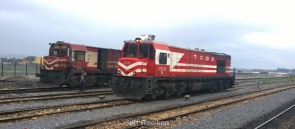With French national railway freight company Fret SNCF in deep financial and structural troubles in mid-2000 they capsized the single freight car traffic over 50 %.
The financial crisis reduced even more connections to industry and the modal split became less 10 % in favour for rail transport. Flexibility, operation on short notice, easy access, price advantages … all were in favour of the road transport.
The French minister department of Ecology and Transport made 2006 a wakeup call for changes in freight transport by rail. A commission under the former SNCF marketing developer Jacques Chauvineau proposed to copy the American short line system into France. Under the project name OFP (Opérateurs Ferroviaires de Proximité – Short Line Operator) a new concept was designed. The goal contained to build up twenty OFP’s in ports and regional centres until 2020. With the program NTEM 2010-2015 (Nouveau Transport Écologique de Marchandises – New Ecological Freight Transport) this new strategy became part of a national program to revitalise the rail freight and feed the national rail operators with more volume. The French rail track company SNCF Réseau has to adjust investment to rebuild and repair old short lines.
With regional department for development, private rail operator ECR and the support of the private rail association Objectif OFP the setup of the first OFP started 2009 at the port of La Rochelle (Atlantic coast of France). In 2016 we have about ten OFP operational and several more in formation. Open access freight operators like Euro Cargo Rail, Europorte, OSR Rail (SNCB subsidiary), VFLI (SNCF affiliated private company for low cost operation) and RegioRail (subsidiary of Belgian logistics company Eurorail) all invested in the setup and helped with operation knowledge and connection to country wide train connections to attract new business from industrial, logistics and port companies.
Conclusion: The French national OFP (short line) strategy gave the rail freight business fresh “blood” and the federal goal of a modal split of over 20 % could be in line within a few years. The OFP model could give Turkey also a chance, to rebalance the lost rail freight traffic with its industry. With regional and private funding of local short line operators in ports, industrial zones and new logistic terminals the rail may get a chance to revitalise too.
by Peider Trippi
Cover Photo: Euro Cargo Rail ©
Categories: Railway Companies








Thank you for this interesting article Peider. Personally I am not convinced that this type of operation can be transferred to Turkey. The reason is that historically the Turkish railway network has been quite sparse, with very little of the duplicated lines which grew up in Western Europe as rival companies built competing lines. So there are very few lines in Turkey which could be converted to Short Lines operation.
I fully concur with Jeff’s comment.
At their peak before WW2, the French railways had more that 42000 km of lines. Today we are down to 30000km, of which 9000 km are low traffic freight only lines that SNCF is eager to drop, thus creating space for local operators. SNCF, mostly because of union regulation, cannot operates those lines efficiently. At this moment, the local operators in France failed to reverse the downward trend in freight traffic.
Except for a very few odd lines, the Turkish network never had such excess in lines. And to be honest, TCDD is nothing more than a big short line operator.